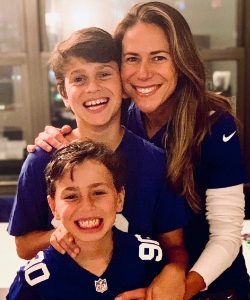 “From the moment I joined Katten, the attorneys most keen to invest in me — both personally and professionally — quickly became my mentors,” says Katten’s Allison Yacker.
“From the moment I joined Katten, the attorneys most keen to invest in me — both personally and professionally — quickly became my mentors,” says Katten’s Allison Yacker.
“Reflecting on that moment, not only were those mentors some of the smartest and hardest working attorneys at Katten, but more importantly they were the ones who realized this was a two-way street.” Years later, Yacker now co-chairs the firm’s Investment Management and Funds practice and is based in New York.
Yacker offered insights on her journey to becoming a firm leader, and being recognized as a great mother and a go-to legal counsel for some of the largest global financial institutions.
Pivoting to Make Her Own Path, and Rising to Leadership at Katten
Throughout her 18 years at Katten, Yacker continues to rise through the firm ranks: from being selected as a summer associate, to becoming one of the youngest capital partners in the firm, to acting as a co-chair of the New York Financial Markets and Funds practice group and serving as a member of the firm’s Board of Directors.
“I knew Katten was a great place to work, and by the time I was a third-year associate I had solidified a terrific roster of mentors who happened to be all men,” Yacker said. “As I thrived in my career, I was determined to make capital partner by the time I was 40 and to serve in a leadership position at the firm because I wanted to prove to myself that it was possible and to help create a similar path for other women in the firm.”
And she did just that.
Yacker began her career at Katten in the corporate group, handling general securities work and mergers and acquisitions. She credits this experience with providing her the skillset that would serve as the foundation for her current practice.
Soon Yacker was presented with the opportunity to be seconded to a major financial institution, where she gained practical legal experience in the derivatives and private funds market. Yacker relished the experience, and quickly found that the clients she enjoyed working with the most were traders and key decision-makers at hedge funds and private equity funds.
When she returned to the firm from her secondment, she quickly realized that she was one of only a few associates who could handle complex derivatives and structured products transactions for both the buy and sell sides. These types of transactions were regularly handled by the Financial Markets and Funds group, so when practice leaders invited her to join the group she knew it would provide her the platform needed to expand upon this niche. She jumped at the opportunity.
But in 2008, when the Dodd-Frank Act was enacted, she quickly realized that the complex derivatives transactions that she had spent a significant amount of time on were essentially regulated out of business. Good lawyers anticipate future risks; great lawyers identify it and pivot. It was at that moment Yacker decided to move away from derivatives and toward refocusing her practice on fund formation and investment management. There she found success faster than anticipated, and her clients quickly came and continue to rely on her to serve as their outsourced general counsel. Later on, she would pivot again – this time toward representing sophisticated investors looking to make investments in hedge funds, private equity funds, and other alternative financial products.
Today Yacker represents hedge funds, private equity funds, commodity pools and managed account platforms that engage in a wide variety of strategies, including quantitative trading, private credit, distressed debt, futures, litigation finance, securitized products, affordable housing, renewable energy and carbon credits, to name a few. She also advises clients with regards to seed and early stage investment opportunities and global regulatory issues that arise in connection with investments in funds and managed accounts.
“You need to be able to work dynamically within your industry to find a practice that makes sense for you — one in which you respect and like the client base, and, most importantly, one that you enjoy,” Yacker said. “Do not be reactionary when it comes to your career, be proactive, take the reins and make the tough decisions.”
Being Her Personal and Professional Self
In 2018, Yacker was named Katten’s Working Mother of the Year by Working Mother magazine. The article profiling her pointed out how integration of personal and professional self is only growing in importance.
“Personal and professional—the lines become blurred when you’re predominantly working from home in New York City and raising two children who are remote learning,” she said. “It’s definitely a challenge to shift back and forth between the mom hat, the teacher hat, and the lawyer hat,” says Yacker. “When it comes to my kids, I make every effort to do so with love and respect, and of course a sense of humor, which I know resonates with my children.”
All joking aside, she remarked that her career often dictates that she be deliberate and efficient with her time, and that she create boundaries for herself and her children so that no aspect of the services she provides to her clients is impacted. To that end, she noted that she periodically goes to Katten’s mostly empty midtown Manhattan office when she has an intense work day planned, and joked that she never thought she would enjoy going to an office as much as she does now.
Positive Vibes and Being the Difference
Yacker is most energized about her work when her clients commend her skillset, style and work ethic when it comes to servicing their needs.
“My clients often remark that they see me as a true counselor — a person that they know will give them not only insightful legal advice and the answer under the law, but also an answer that will work for their businesses,” she says. “My clients know that I am not a scrivener, and that I don’t stop at ‘no you can’t’ when they have a difficult issue — I’m here to solve their problems, to be creative, and to use the resources of my firm to find the best possible solution to any problem they have and to get the deal done.”
Yacker primarily attributes her professional integrity and intense work ethic to her grandfather, whose first job after arriving in America after surviving the Holocaust was that of a janitor who made 65 cents an hour. Through incredibly hard work, her grandfather eventually built a successful business. Both of her grandfathers were incredibly hard workers but family came first to them. To Yacker, every day that she puts in a hard day at work is a testament to her grandparents and an attempt to honor their memory.
Learning Along the Way
Yacker gained valuable insight while ascending to become one of the firm’s youngest capital partners.
She recommends that young lawyers work with and learn from as many different lawyers as possible.
“You learn different ways of thinking, different ways of networking, different analytical abilities, and different techniques for maintaining relationships and running a practice,” she observes. “I think that’s been critical to my success.”
Yacker also says that she has always worked hardest for the people who were fully invested in her.
“Seek out mentors who are looking to invest in you personally and professionally,” says Yacker. “And take those relationships as seriously as possible. And then, give back to younger associates in the same regard.”
And most importantly, she encourages young lawyers to take ownership of their careers — not to wait for an opportunity to be handed to them, but rather to take the initiative in building a successful practice and to think proactively and deliberately about their goals.
Networking and Outreach
Yacker stays connected with her clients and colleagues — even in pandemic times. Whether it be a virtual group wine tasting, hosting socially-distanced cocktails and meals on her terrace, or virtual tea with clients in London, Yacker tries her best to proactively stay in touch with her clients both professionally and personally.
She has found it particularly fulfilling to work on pro bono matters, providing legal counsel through the Small Business Legal Relief Alliance to small businesses in New York that are struggling during the global pandemic.
Yacker also sits on the steering committee and national mentoring panel of the Katten Women’s Leadership Forum, which supports the growth of Katten’s women attorneys with professional development events, networking and practical advice.
She is also one of the founding members of Katten’s Women in Finance Initiative, which seeks to build a strong community of women within the firm with a view toward driving cross-selling opportunities and driving more business to this community.
She is an Angel Member of 100 Women in Finance, an organization dedicated to empowering women in the finance and alternative investment industries through meaningful connections, high-impact programming and initiatives that help build the pipeline of future leaders in the industry.
Also close to her heart is the new Parents Affinity Group at Katten—a virtual support group for attorneys and business professionals to connect with each other and discuss approaches to navigating work and family responsibilities.
Crowing Achievement
As committed as she is to her professional success, she views her crowning achievement as the balance she has struck between being a successful lawyer and being a successful mother.
“My children know that mommy’s business means I have to be available to my clients almost all the time, so I work a lot. I think they respect me for how hard I work at my job, but they 100 percent know that they come first and they always will,” Yacker said.
Yacker’s “work hard, play hard” attitude has always resonated with her sons Jackson and Ashton, ages 8 and 12 respectively. She revels daily in how resilient they are, how kind they are to each other, and how hard they work to do their best in school, even under these extraordinary circumstances. Yacker said she finds inspiration from her kids, who make her want to be the best at anything she is doing.
Her most cherished daily moment is the time when it’s just her and her boys — whether they are on the baseball field, cuddling in bed, or laughing together in hysterics on the couch. Those are the moments she is most grateful for.
By Aimee Hansen






